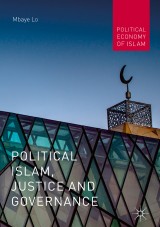Details

Political Islam, Justice and Governance
Political Economy of Islam
|
96,29 € |
|
| Verlag: | Palgrave Macmillan |
| Format: | |
| Veröffentl.: | 08.11.2018 |
| ISBN/EAN: | 9783319963280 |
| Sprache: | englisch |
Dieses eBook enthält ein Wasserzeichen.
Beschreibungen
<p></p><p>This book argues that political Islam (represented by its moderate and militant forms) has failed to govern effectively or successfully due to its inability to reconcile its discursive understanding of Islam, centered on literal justice, with the dominant neo-liberal value of freedom. Consequently, Islamists' polities have largely been abject, often tragic failures in providing a viable collective life and sound governance. This argument is developed theoretically and supported through a set of case studies represented by the Muslim Brotherhood in Egypt (under President Muhammad Morsi’s tenure), Hassan Turabi's National Islamic Front in Sudan and The Islamic State in Iraq and Syria (ISIS). It is ideal for audiences interested in Regional Politics, Islamic Studies and Middle Eastern Studies.</p><br><p></p>
1. Justice Versus Freedom: The Dilemma of Political Islam.- 2. From Liberal Freedom to Neo-liberal Inequality: The History of the Freedom Agenda.- 3. Freedom in Islamic Political Thought and Justice and Its Islamist Agents.- 4. From Political Islam to Militant Islam: The Pursuit of Justice.- 5. The Collapse of the Egyptian Revolution: Liberal Freedom Versus Islamist Justice.- 6. The Islamic State: The Rise of the Vigilante Justice.- 7. Turabi's Islamic Project: From the Rhetoric of Freedom to the Politics of <i>Tamkeen</i>.- 8. Morsi's Dilemma: The Shifting Sands Between <i>Shar'iyyah</i> and Shari'a.- 9. Conclusions: Beyond Justice and Freedom! <div> <br></div>
<b>Mbaye Lo </b>is Associate Professor of the Practice of Asian and Middle Eastern Studies and Director of Duke in the Arab World Academic Program, Duke University, USA.
<p>This book argues that political Islam (represented by its moderate and militant forms) has failed to govern effectively or successfully due to its inability to reconcile its discursive understanding of Islam, centered on literal justice, with the dominant neo-liberal value of freedom. Consequently, Islamists' polities have largely been abject, often tragic failures in providing a viable collective life and sound governance. This argument is developed theoretically and supported through a set of case studies represented by the Muslim Brotherhood in Egypt (under President Muhammad Morsi’s tenure), Hassan Turabi's National Islamic Front in Sudan and The Islamic State in Iraq and Syria (ISIS). It is ideal for audiences interested in Regional Politics, Islamic Studies and Middle Eastern Studies.</p>
<p><b>Mbaye Lo</b> is Associate Professor of the Practice of Asian and Middle Eastern Studies and Director of Duke in the Arab World Academic Program, Duke University, USA.</p><br>
<p><b>Mbaye Lo</b> is Associate Professor of the Practice of Asian and Middle Eastern Studies and Director of Duke in the Arab World Academic Program, Duke University, USA.</p><br>
Argues that political Islam failed to govern effectively or successfully due to its inability to reconcile between the neo-liberal focus on individual freedom and Islamists' emphasis on a stultified, literal idea of justice Provides a theoretically developed argument supported by case studies about the challenges inherent to Islamist forms of governance Analyzes the intellectual history and institutions of political Islam in the Arabic speaking world
<p>“Dr. Mbaye Bashir Lo’s alertness to the centrality of literal justice in the Islamist practices is of great importance and, commendably, worthy of admiration. It reminds the reader, any reader, that centralizing justice does not necessarily mean ignoring other contributing factors to human freedom.” (Said Khaled El Hassan, Professor of Political Theory, Endowed Chair in Islamic Civilization and Human Coexistence at Mohammed V University in Rabat, Morocco)</p><p></p><p>“Without falling into the traps of simplistic essentialism, Mbaye Lo eloquently shows how different articulations of chief values in Western and Islamic traditions have important consequences when it comes to issues of governance in contemporary Islamist polities.” (Massimo Ramaioli, Assistant Professor, Social Development and Policy Program, Habib University, Karachi, Pakistan)</p>
<p>“Mbaye Lo advances a bold thesis, at once well articulated and substantively documented. It crosses disciplines without violating academic integrity or muddling research methodology. It represents a central issue—justice vs. liberty—that will remain central to global politics, in the Arab world and beyond.” (Bruce B. Lawrence, Professor of Islamic Studies Emeritus, Duke University, USA)</p><br><p></p>
<p>“Mbaye Lo advances a bold thesis, at once well articulated and substantively documented. It crosses disciplines without violating academic integrity or muddling research methodology. It represents a central issue—justice vs. liberty—that will remain central to global politics, in the Arab world and beyond.” (Bruce B. Lawrence, Professor of Islamic Studies Emeritus, Duke University, USA)</p><br><p></p>

















